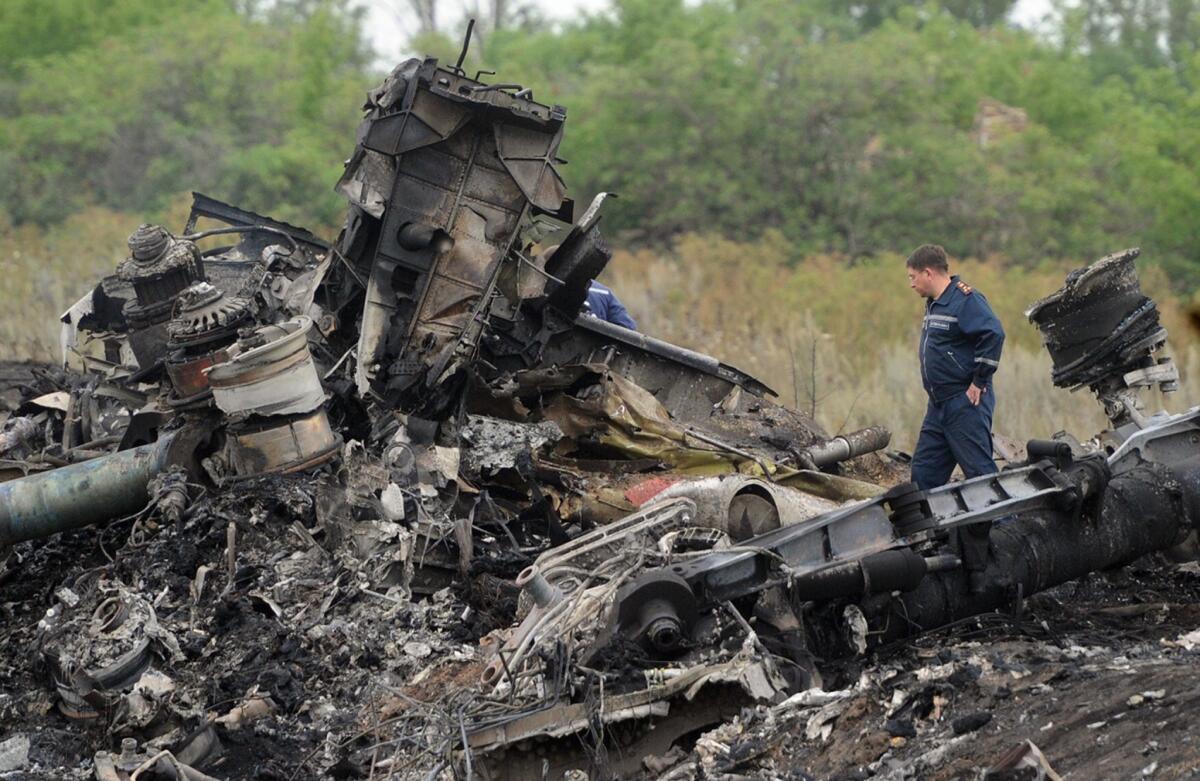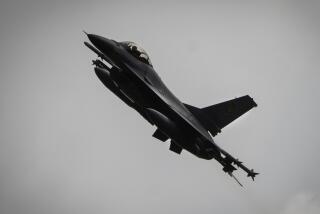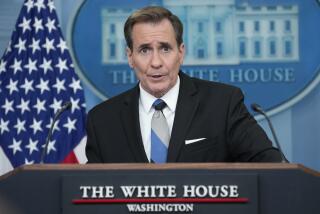U.S. weighing new sanctions if Moscow is linked to airliner crash

Obama administration officials are already considering slapping Russia with further sanctions if investigations determine that the Malaysia Airlines jet that went down Thursday in Ukraine was hit by a missile supplied by the Kremlin to Ukraine separatists, a senior administration official said.
Administration officials also believe that if it is established that Russia was the supplier, that could persuade European countries to toughen their sanctions on Russia as well, the official said.
The crash, which killed all 298 people on board, “illustrates the dangers in letting this civil war continue,” said the official, who requested anonymity in order to discuss the crash.
U.S. officials haven’t yet concluded that the crash was caused by a Russian missile, though Vice President Joe Biden on Thursday said there was evidence that the aircraft was shot down.
Many analysts believe it is likely that the attack was carried out by separatists with Russian arms. Russia has been sending air-defense systems, tanks and artillery to help their separatist allies, who have shot down several Ukrainian government aircraft.
Igor Strelkov, a separatist leader, wrote on his Web page Thursday, shortly after the airliner crashed, that aircraft should not fly in the region.
“We have warned you — do not fly in our airspace,” he wrote.
The crash has stirred outrage across much of the globe. World leaders, including German Chancellor Angela Merkel, were already demanding an international investigation of the crash, and the United Nations Security Council was taking up that issue Friday.
U.S. officials said were no indications that any U.S. citizens were aboard the flight. None of the passengers were listed as U.S. citizens, and no family members had called State Department offices seeking information so far.
But it remains possible that some passengers held dual passports. If U.S. citizens were aboard, that would further raise the stakes for the Obama administration and draw the FBI into the investigation.
So far, European countries have imposed weaker sanctions on Russia than the United States over the Kremlin’s seizure of Ukraine’s Crimea peninsula in March and its support for pro-Russia separatists in eastern Ukraine. But if an investigation shows Russian complicity in the downing of the airliner, European officials are expected to feel powerful pressure to do more.
Of the total, 189 of the passengers were Dutch; at least 17 were from other European countries.
Francois Heisbourg, chairman of the International Institute for Strategic Studies, said he believed that strong physical evidence of what happened to the aircraft will eventually come out.
Even if the separatists seek to hide some of the plane debris “it will be very difficult to prevent the emergence of watertight attribution to the separatists, with Russian complicity.” He said that if the separatists seek to carry the evidence away by truck, that would probably be spotted by Western intelligence.
Heisbourg, a former French government official, said he believed the discovery of evidence of Russian complicity would result in a “big hardening of the line” by European countries.
France could hold off on its planned sale of Mistral warships to Russia, he said, and Germany, which has resisted strong retaliation against Russia, might be compelled “to make some hard decisions.”
Heisbourg said that, following past practice, Russian President Vladimir Putin would probably pull back his support from the separatists in reaction to world condemnation, making the crash a turning point in the war.
But he added that Putin’s takeover of Crimea meant there was now some uncertainty about how the Russian leader would react.
Steven Pifer, a former U.S. ambassador to Ukraine, said separatists were suspected of shooting down the plane because the Ukrainian military’s missiles were further from the front lines.
He said it was likely that the West would begin pressing much harder on Russia to stop its arms supply to the separatists.
Pifer, now with the Brookings Institution, said there were strong arguments for Putin to shift ground and reduce his support for the separatists. Already, he noted, the Russian leader has gotten much of what he has wanted: The Ukrainian government has agreed to decentralize power in Ukraine, to respect the Russian language, and not to seek to join NATO.
Yet Pifer would not predict that Putin would change course and yield to Western pressure.
“It would be a total guess,” he said.
Following international news coverage on Twitter at @richtpau.
More to Read
Sign up for Essential California
The most important California stories and recommendations in your inbox every morning.
You may occasionally receive promotional content from the Los Angeles Times.










